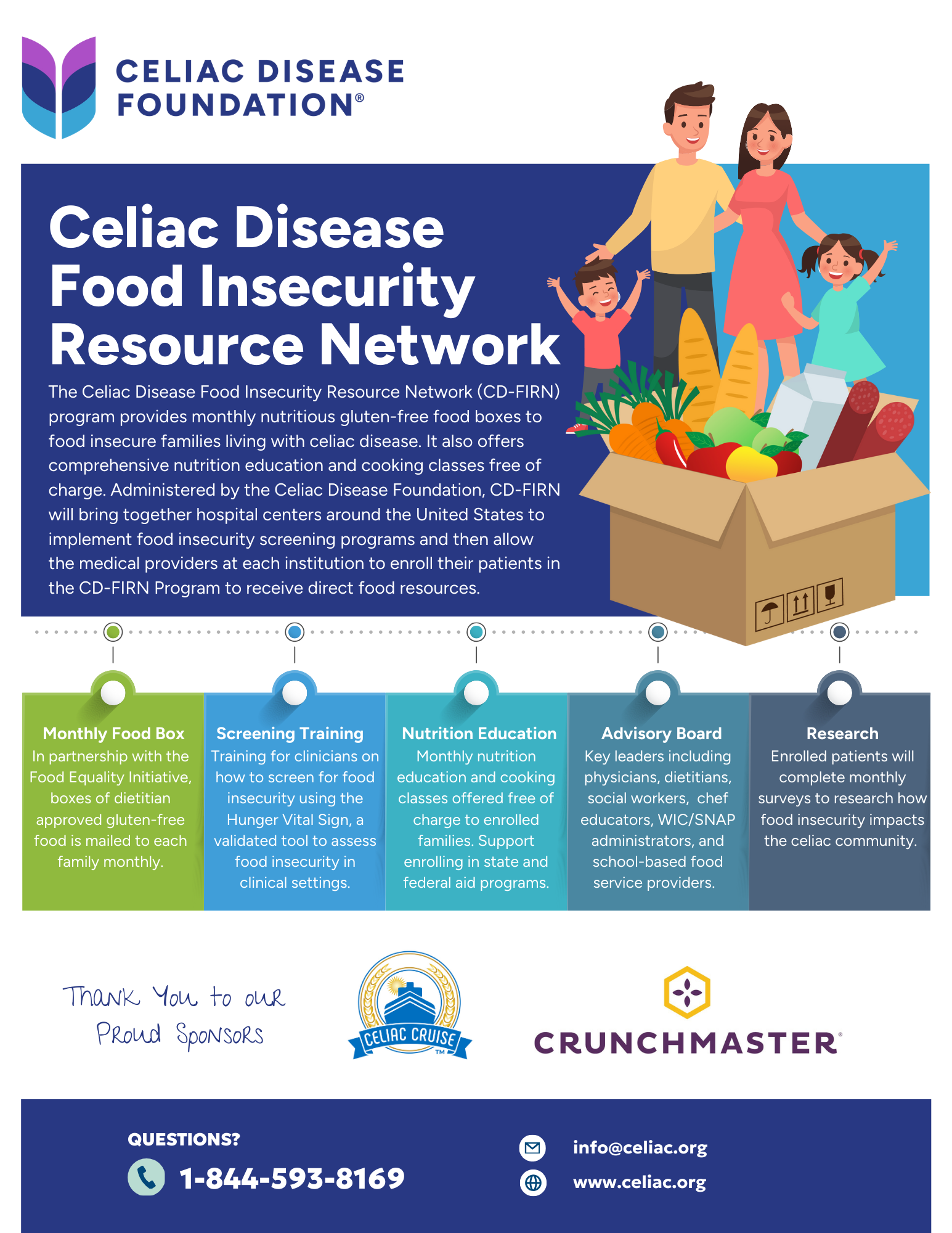Food Insecurity Resources for Healthcare Providers
Supporting Food Insecure Families with Celiac Disease
The Celiac Disease Foundation is committed to providing healthcare providers with the support and resources they need to help their patients access safe, gluten-free food. Here are some key programs and resources to help healthcare providers support their patients on this journey.
Research on Food Insecurity in the Celiac Disease Population
Food insecurity is a significant concern for many families, and it poses additional challenges for those living with celiac disease. The need for a strict gluten-free diet can exacerbate the difficulties faced by food-insecure individuals and families. Recent research highlights the unique struggles and increased prevalence of food insecurity within the celiac disease community.
Prevalence of Food Insecurity
Studies have shown that individuals with celiac disease are at a higher risk of experiencing food insecurity compared to the general population. The additional cost of gluten-free foods, which can be substantially higher than their gluten-containing counterparts, is a major contributing factor.
- A recent study from Boston Children’s Hospital (BCH) found that 24% of pediatric celiac patients experienced general food insecurity during the COVID-19 pandemic and that when asked specifically about gluten-free food, 27% of the patients screened positive for food insecurity.
- Another study found that 1 in 6 celiac patients are food insecure.
Impact on Health
Food insecurity can lead to poor dietary adherence and nutritional deficiencies in people with celiac disease. Limited access to gluten-free foods may force individuals to consume gluten, leading to adverse health effects and potential complications associated with celiac disease.
- Less than 1/4 of food insecure celiac patients adhere to a gluten-free diet, according to one study.
- At diagnosis, another study showed that patients with celiac disease had 1.70–2.75 times higher healthcare-associated costs than individuals without celiac disease.
Psychosocial Effects
The stress and anxiety associated with both managing a strict gluten-free diet and dealing with food insecurity can have significant psychosocial impacts. Research indicates higher levels of depression and anxiety in food-insecure individuals with celiac disease.
- One recent study presented at Digestive Disease Week 2024 showed that compared to food secure celiac patients, food insecure celiac patients reported reduced quality of life and increased anxiety and depression.
Economic Burden
The economic burden of a gluten-free diet is well-documented. Families with celiac disease often spend more on groceries, which can be a significant strain for those already struggling financially. This economic pressure can exacerbate food insecurity.
- Gluten-free products are up to 183% more expensive than gluten-containing counterparts
Screening for Food Insecurity
Screening for food insecurity is critical for healthcare providers working with celiac patients. Understanding the available screening tools can make screening simple and easy to implement in your practice.
Hunger Vital Sign
The Hunger Vital Sign is a validated two-question screening tool used to identify individuals at risk of food insecurity. It involves asking the following questions:
“Within the past 12 months, we worried whether our food would run out before we got money to buy more.”
“Within the past 12 months, the food we bought just didn’t last, and we didn’t have money to get more.”
- Positive Responses: Always True or Sometimes True
- Negative Response: Never True
Modified Hunger Vital Sign
It can also be useful to modify the Hunger Vital Sign to screen for Gluten-Free Food Insecurity. Research from Du, et al at Boston Children’s Hospital showed that 3-5% of families with celiac disease would be missed if no gluten-free qualifiers are added to the screening measure.
“Within the past 12 months, we worried whether our gluten-free food would run out before we got money to buy more.”
“Within the past 12 months, the gluten-free food we bought just didn’t last, and we didn’t have money to get more.”
- Positive Responses: Always True or Sometimes True
- Negative Response: Never True
Other Validated Screening Tools
- USDA Household Food Security Survey Module (HFSSM): A more detailed questionnaire that can provide a comprehensive assessment of food security status.
- Spanish Translation of the USDA Food Security Survey Module: A Spanish translation of the U.S. Household Food Security Survey Module was developed by USDA researchers from previous translations by researchers at UCLA and the National Center for Health Statistics.
Celiac Disease Foundation Food Insecurity Resource Network (CD-FIRN)
The Celiac Disease Foundation has partnerships with hospitals nationwide to support their food insecure celiac patients. We are currently enrolling patients at 18 hospital centers.
- The Celiac Disease Food Insecurity Resource Network (CD-FIRN) program provides monthly nutritious gluten-free food boxes to food insecure families living with celiac disease. The program is administered by the Celiac Disease Foundation in partnership with the Food Equality Initiative.
- Hospitals interested in learning more about joining the CD-FIRN program, please contact Vanessa.weisbrod@celiac.org.
- Please note that you must have a referral from a medical provider affiliated with the CD-FIRN program to utilize this program.
- Companies interested in supporting the CD-FIRN program, please contact janie.magill@celiac.org
- Individuals looking for food support resources, please contact info@celiac.org.

